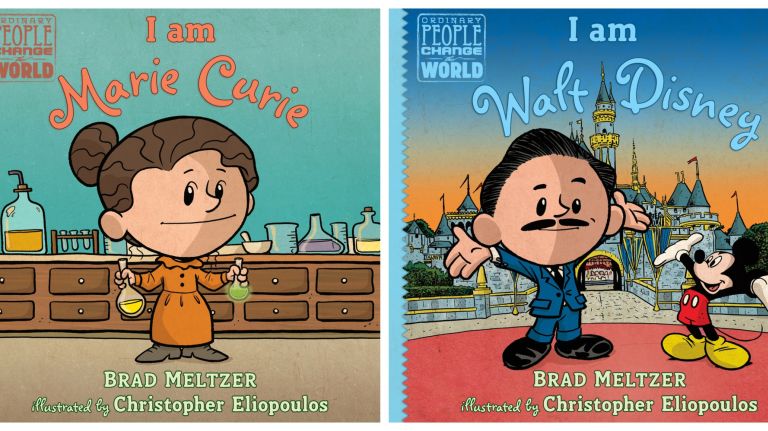
Brad Meltzer’s “Ordinary People Change the World” book series has put biographies of more than 20 important historical figures into the hands of young readers.
The books, beautifully and soulfully illustrated by Chris Eliopoulos, are colorful introductions to the likes of Abraham Lincoln, Rosa Parks, Jane Goodall, Sacagawea and Sonia Sotomayor, to name a few.
The latest in the series looks at Walt Disney and Marie Curie.
“Walt Disney is one of the great American success stories,” Meltzer says. “He gives us happily ever after. But his story is just far more complex than that. … When he turns 21 Walt Disney’s first film company is a total disaster. They tell him he’s going to go broke. He’s sleeping in his office. He’s taking a bath once a week in a local train station. And I want my kids to know that when you chase a big dream you may fail but if you get back up again that’s how you fly.”
Curie, the Nobel Prize winning scientist was, as a child, denied an education in science by the Russian government, he says.
“They thought it would make them too powerful,” Meltzer says. “And the best part is they were right. Marie Curie as she turns 16, she says she wants to be a scientist. … She finds this college that basically breaks the rules and decides to teach science to women." The most important part of the story is that throughout her life Marie Curie "is denied things because she’s a woman, she just never lets it stop her," he adds. "And I want my daughter to have that lesson and I want my sons to have that lesson.”
Meltzer says the key to getting the lessons of these individual’s lives through to young readers is to get to them early.
“I realized that the secret sauce is not just showing these heroes when they’re famous, but show them when they’re kids,” he says. “Show our readers what these heroes were like as children. And then kids realize that these aren’t the stories of famous people, this is what we’re all capable of on our best days.”
Meltzer focuses in on the simple premise: What will a kid care about?

“That’s most important because they have to fall in love — just like a thriller, or just like any other book I write — they have to fall in love with the main character,” he explains. “But on top of that, I don’t focus on the historical side. What I focus is on the character side. On that moral value side. The books have never been books about history. They’re books about character. And I think that has always been the most important thing for us. I think that’s why parents responded to the books. We get people who write us letters."
That includes instructors. Meltzer recalls a pair of teachers who did an entire “Ordinary People Change the World” module for their classes where the kids would stay a hero and write their own book, followed up by a musical with original songs based on the kids’ books. Another teacher had the kids dress up as the heroes and put on a wax museum. Another did a play.
And the lessons are not just in the classroom. Meltzer tells of a man, who is white, and his daughter, who is African American. After they finished reading “I am Rosa Parks” together — including the educational profile at the end with real photos and a timeline of their lives — she says, “‘Wait a minute. This really happened?’ And he said suddenly he was having his first ever conversation about race with his daughter, which of course as a mixed-race family, he’s like, I should have done [this]. But you just get intimidated. Race is an intimidating subject. And there it was — the conversation started. When we write the books, we can never anticipate that that’s going to happen.”
The book series will be continuing, with “I am Leonardo da Vinci” coming up next. But the exciting news really is the television series adaptation, “Xavier Riddle and the Secret Museum,” which will begin airing on PBS Kids Nov. 11.
“‘Xavier Riddle and the Secret Museum’ is about a boy named Xavier,” Meltzer says. “His sister Yadina and their best friend Brad, the most handsome cartoon of all time. They gave me hair which I really appreciate. But the stuff on the show is simple. Xavier and his friends have a problem being bullied. They go back in time via their secret museum to meet Rosa Parks. Rosa Parks teaches them how to deal with bullies and they come back to the present and use that lesson. And in every episode they meet a different hero. They go back and meet a hero who teaches them a lesson in whatever they need. Whether it’s perseverance or whether it’s dealing with others.”
The show is premiering 50 years and a day after “Sesame Street” launched.
“So, no pressure for us,” Meltzer says with a laugh.




































